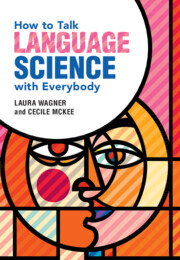Book contents
- How to Talk Language Science with Everybody
- How to Talk Language Science with Everybody
- Copyright page
- Contents
- Figures
- Preface
- Acknowledgments
- 1 Why Bother?
- 2 You Can Be the Expert
- 3 Cooperative Conversations
- 4 Conversational Goals
- 5 Know Your Audience
- 6 Creating Relevance by Generating Interest
- 7 Creating Relevance by Making Connections
- 8 Quality and Credibility
- 9 Quality vs Quantity
- 10 Learn to Listen
- 11 Information Structure
- 12 The Curse of Knowledge
- 13 Start with Examples
- 14 What’s New?
- 15 From Given to New
- 16 The Three-Legged Stool Approach
- 17 Working with a Range of Different Audiences
- 18 Where Can I Go?
- 19 Being a Good Partner
- 20 Finale
- Appendix Teaching with This Book
- References
- Index
10 - Learn to Listen
Published online by Cambridge University Press: 17 May 2023
- How to Talk Language Science with Everybody
- How to Talk Language Science with Everybody
- Copyright page
- Contents
- Figures
- Preface
- Acknowledgments
- 1 Why Bother?
- 2 You Can Be the Expert
- 3 Cooperative Conversations
- 4 Conversational Goals
- 5 Know Your Audience
- 6 Creating Relevance by Generating Interest
- 7 Creating Relevance by Making Connections
- 8 Quality and Credibility
- 9 Quality vs Quantity
- 10 Learn to Listen
- 11 Information Structure
- 12 The Curse of Knowledge
- 13 Start with Examples
- 14 What’s New?
- 15 From Given to New
- 16 The Three-Legged Stool Approach
- 17 Working with a Range of Different Audiences
- 18 Where Can I Go?
- 19 Being a Good Partner
- 20 Finale
- Appendix Teaching with This Book
- References
- Index
Summary
Chapter 10 opens by asking readers to choose two kinds of people they might encounter in informal learning settings and to identify questions those people might have about their general topic and about their specific activity. Returning to the fact that a successful conversation is cooperative, this chapter emphasizes asking questions and listening. Asking questions of an audience gives the expert substantive information to listen to. Sets of questions give people choice, and the sets can include questions about explanations of the phenomena being shown. A "juicy question," for example, is one that nonexperts can address by using the materials/examples at hand – in effect, encouraging scientific reasoning. Giving people time to answer questions and then listening carefully as they do so shows respect, as does asking new questions that reflect people’s earlier responses. Readers are cautioned to avoid testing their audience or to feel that they themselves are being tested. The Worked Example finds juicy questions in a map-based demonstration of variation in regional dialects.
- Type
- Chapter
- Information
- How to Talk Language Science with Everybody , pp. 116 - 128Publisher: Cambridge University PressPrint publication year: 2023



